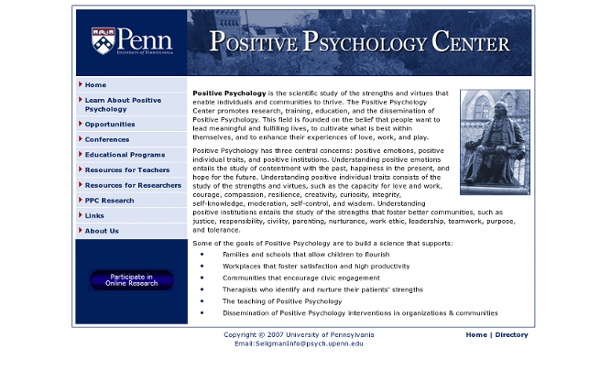Positive Psychology Center

D?couvrez la psychologie
:: Authentic Happiness :: Using the new Positive Psychology
www.cpa.ca > Welcome
American Psychological Association (APA)
asiansocialpsych.org
On this site you will find information about Asian Association of Social Psychology's history, publications, and current activities. Please use the menu on the left of the page to find the information you want. Join AASP Latest AASP Newsletter (December 2013) You can access the AASP Newsletter Number 12 for December 2013 (PDF, 1.8 MB). 2013 AASP Conference The AASP 2013 Conference was held at Yogyakarta, Indonesia. Publishing Seminar: AJSP 2011 Advance Look: AJSP Upcoming Articles
APS Observer - Asian Psychology Coming of Age
Cover Story Nonverbal Accents By Andrew Merluzzi Vol.27, No.4 April, 2014 It’s long been believed that people of all ages and ethnicities express their states of mind with the same physical cues. Presidential Column Translating Psychological Science to Law (and Back) By Jerry Kang and Nilanjana Dasgupta A legal scholar and a social psychologist are working closely to bring behavioral science to bear on the legal system. Mining the Unconscious By Ran Hassin Scientists dig into the submerged layer of cognitive function. Property Values By Ori Friedman Children begin learning at a very young age what’s theirs and what’s not. Powering Products With Psychological Science By Mariko Hewer Psychological scientist Mary Czerwinski explores how embedding sensors into clothing can measure — and possibly help regulate — emotions. Neuroscience Outreach By Bill Griesar Teachers use both high-tech tools and old-school collaboration to fuel interest in psychological science. By Beth Morling April 15, 2014 More>
Qu'est-ce que la sophrologie ?
Soci?t? Fran?aise de Psychologie
Related:
Related:



